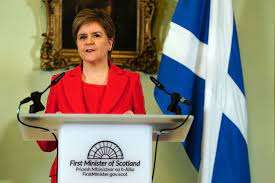
Nicola Sturgeon today (15 February) dropped a huge bombshell that has sent shock-waves through Scottish and UK politics by announcing that she is to step down as the country’s First Minister. She broke the news from her official residence at Bute House, in a specially convened press conference.
She has been the longest serving occupant in the top role and has become associated with her party’s independence movement since taking over the SNP in November 2014. She had replaced her mentor Alex Salmond, who she had been deputy to for the previous seven years, after the electorate voted against the change.
Her party has been rocked in recent months with some controversial issues including the reform of gender recognition laws and disagreements on how to secure a second independence referendum; but she was still highly thought of by a decent percentage of the population after her effective communication during the difficult pandemic period.
All change in just a matter of weeks
It was just three weeks ago, that Nicola Sturgeon boldly stated that there was “plenty left in the tank” and that she hoped very much to be the leader who takes Scotland to its independence, but the Irvine born politician has decided now that she has had enough and will leave the role that she has often described as the “best job in the world.”
Journey to leadership
She had joined the SNP at the age of just sixteen and after working as a lawyer, her big entry into full-time politics came when she was elected to the new Scottish Parliament in 1999 at the age of 29. In 2011 and now Mr Salmond’s deputy, their party won an unprecedented majority of seats, which by the time she had taken over as leader saw the SNP win an incredible 56 out of 59 in Scotland, at the UK general election.
Rifts began to develop in the party, especially following Mr Salmond’s sexual assault charges, which he was eventually acquitted of, but divisions emerged and her relationship with her former mentor deteriorated.
Possible hint given last month
There had been some speculation about the First Minister’s future, but nobody saw today’s announcement coming, although maybe there was a hint last month when after New Zealand’s Prime Minister Jacinda Ardern announced her resignation, Ms Sturgeon said: “If I ever reach the point that she has clearly reached, where I think overall I just can’t give the job everything it deserves, then I hope I have the same courage she’s had in saying, ‘OK, this is the point to go’.”
Knowing when the time is right
She began her address by once again insisting that the job is the “very best job in the world”, but quickly added that it is important to know “almost instinctively” when the time is right to make way for someone else. Before going through her reasons she acknowledged some people will be “upset”, some “angry” and joked that others will “cope just fine” with the news, but said her decision had come from a place of “duty and love.”
Funeral of friend clarified decision
She then went into more detail, firstly explaining that she asked herself two questions which were: “is carrying on right for me? and is carrying on right for the country?” And she concluded that the answer to both was “No”, and admitted that she had been wrestling with the notion to go for some weeks.
“I have been thinking about it with oscillating intensity,” she remarked with a knowing smile, but stated that it started to “crystallise a bit more” in the last week or so. Then, showing a softer side, she spoke of attending the funeral for 89-year-old independence campaigner Allan Angus the day before, which she said, had a “clarifying effect” on her thinking.
Covid leadership by far toughest
The weight of responsibility was she said “immense” during the Covid outbreak, saying that leading Scotland through the pandemic was “by far the toughest thing I have done, and probably will ever do.” She felt that there is a need for “energy” in political leadership and that public opinions on her have now become barriers in the party’s quest for independence.
She feels that any controversial issues “end up almost irrationally so” because of perception. She highlighted that whilst she could go on, for another few months, six months, even a year, she knew that as time passed, she would have less and less energy to give to the job, so she believed she owed it to the country to go now.
Thanks given to family
Then possibly giving a bit of a clue to a contributing factor, she made the point that she will be 53 later this year and has been “Nicola Sturgeon the politician all my life, and maybe I want to spend a bit of time on Nicola Sturgeon the human being. Does that sound selfish? I hope it doesn’t.”
Now close to tears she said she wanted to thank her husband and her family for being her “rock throughout”, as well as the SNP and people of Scotland. She called being the first minister “the privilege of my life.”
She confirmed that although stepping down, she will not be leaving politics and will continue with personal campaigns, but added that she is looking forward to “a different way of living life.”
Press questions
Answering questions from the press, Ms Sturgeon was asked if it was a failure of her leadership not to deliver independence, to which she responded: “I will leave other people to judge on that.” She was challenged on divisions within the party and whether certain key members had lost trust in her leadership, to which she replied that the longer any leader is in office “the more people will find things to disagree with you on.”
Opportunity for Scotland
Alistair Jack the Scottish Secretary referred to Ms Sturgeon as a “formidable politician” and thanked her for her service over the last eight years, but added that her resignation presents a welcome opportunity for the Scottish government to change course, and to drop its divisive obsession with independence and said he would now like to see a Scottish government which “works hand in hand” with the UK government.
Tributes of varying sincerity from other leaders
UK Prime Minister Rishi Sunak thanked her “for her long-standing service”, whilst Plaid Cymru leader Adam Price remarked that she was “a once in a generation politician, driven by an unwavering passion for her country.”
Scottish Labour leader Anas Sarwar, not a huge fan of her opposition leader, said Ms Sturgeon was an “able politician” and acknowledged that she had led Scotland through some of the most challenging times in recent history.
Sinn Fein vice president Michelle O’Neill was a little more respectful paying tribute to her for her strong stance against Brexit and the “undermining of devolution by the Tories in London.”
Labour eyeing some possible gains
SNP political opponents will see this as an opportunity, with Labour in particular eyeing a resurgence in Scotland, in the knowledge that they will very likely need to win many more seats north of the border to take power back in Westminster.
Who will take on the First Minister role?
John Swinney
So now will come the battle for who becomes her replacement. There are several who can throw their hat into the ring with John Swinney being the most obvious. The deputy first minister is the most experienced option open to the SNP, especially given that he has actually led the party before, admittedly nearly twenty years ago. He is widely seen as a safe pair of hands, but question marks remain as to whether he would actually want to take up the leadership again.
He paid his own tribute to Ms Sturgeon tweeting: “She has given outstanding leadership to our country, government and party, delivering breath-taking electoral success. It has been my privilege to support her and she has my warmest good wishes for the future and heartfelt thanks for all that she has done for Scotland, for the cause of Independence and the Scottish National Party.”
Kate Forbes
The finance secretary, Kate Forbes comes into the reckoning after her meteoric rise through the ranks of government. She was left to deliver the 2020 Scottish Budget with just hours notice and her performances since then have made a big impression and few would be surprised if she took the next step up to the highest office in Scotland. The timing may not be right however, as she is currently on maternity leave following the birth of her first child.
Angus Robertson
Many believe Angus Robertson may see himself as a future first minister, but whether that is a widespread view among his colleagues is another matter.
Humza Yousaf
Health secretary Humza Yousaf has held a number of senior posts in government, including as transport minister, Europe minister and justice secretary. He is part of a newer generation of SNP figures and is certainly ambitious, so will very probably fancy a shot at the leadership role.
Joanna Cherry
Joanna Cherry has been a critic of Ms Sturgeon’s leadership on the issue of gender reform, but opted to remain within the SNP, instead of following others out of the party to join Alex Salmond’s new Alba Party. She may see herself as a realistic contender, but could walk straight into more division.
Stephen Flynn
His lack of experience may count against him, but Stephen Flynn is seen as having a different approach and viewpoint to Ms Sturgeon, and could present himself as the “clean break” that the party potentially need.
Maria McAllan
The 30-year-old former solicitor served as a special advisor to Ms Sturgeon before winning a seat of her own, but the feeling is that it could be a little too early in her career to move into the very top job.
Official process kicks into action
Some may have questioned why the First Minister announced her intention to resign, rather than leave immediately, but her formal resignation actually kick starts an official timetable at the Scottish Parliament.
First of all her resignation letter is sent to the His Majesty King Charles III, after which time they have 28 days to elect a replacement, or face another election. With that in mind, Ms Sturgeon will remain in post until a successor is chosen.
The rule book for SNP’s states that candidates must have at least 100 nominations from party members from at least 20 local branches. The vote is run by postal ballot, on a one-person-one-vote basis. Although the timetable for the process is still to be agreed, the on-going issue of whether to use an election as a de facto independence referendum, will undoubtedly have to be factored in.
Five PM’s and three general elections
During Nicola Sturgeon’s time in office she has seen five different prime ministers, all of the conservative persuasion in David Cameron, Theresa May, Boris Johnson, Liz Truss and Rishi Sunak; admittedly three of them in the last six months.
She went through the entire Brexit process and of course oversaw the pandemic lockdowns. She also led her party in three general elections. When she took over Barack Obama was the serving US president, and Francois Hollande was the president of France.
Honour to represent country at Queen’s funeral
She also represented Scotland at the state funeral of the late Queen Elizabeth II which she described at the time as an honour to say goodbye to our “deeply respected and much loved monarch.” She added that it was undoubtedly “one of the most momentous occasions in recent history” and reflected that she always knew how important Scotland was to the Queen, but was moved to see just how much Her Majesty meant to the people of Scotland.”












Scotland will miss an excellent leader